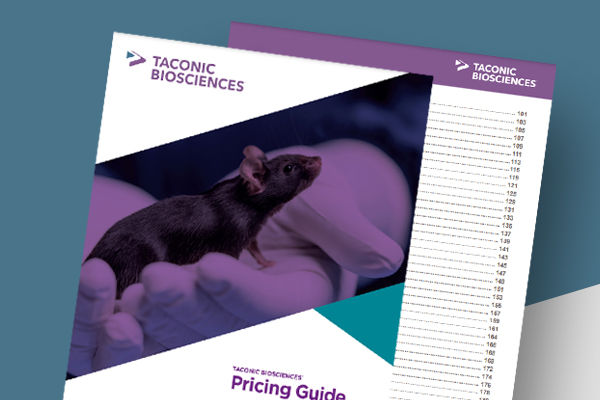| Model No. | Nomenclature | Genotype |
|---|---|---|
| 4091 | B10.D2-Rag2tm1Fwa Tg(DO11.10)10Dlo/AiTac | Inquire for genotype |
Rag2 Knockout/Transgenic DO11.10 T Cell Receptor - Model 4091

- Description
- Price & Licensing
- Overview
- Genetics
- Guides & Publications
- Applications & Therapeutic Areas
- Transit, Housing & Welfare
Overview
Nomenclature: B10.D2-Rag2tm1Fwa Tg(DO11.10)10Dlo/AiTac
The Rag2 Knockout/Transgenic DO11.10 T Cell Receptor line is homozygous for a transgene that encodes a T cell receptor that is specific for a chicken ovalbumin (OVA) peptide, amino acids 323-339, presented by the MHC class II molecule I-Ad. It is also deficient in the Rag2 gene (recombinase activating gene 2) and therefore does not develop endogenous mature T or B cells. Virtually all peripheral CD4+ T cells in these mice express the transgenic TCR. A few CD4- cells also express the transgene. These mice are useful for in vitro studies of CD4+ T cell differentiation into TH1 and TH2 populations, and as a source of donor cells for adoptive transfer into B10.D2 mice for in vivo studies of tolerance and immune responses. Applications include studies of inflammation, T cell development, and tolerance.
Origin
Note: On a few occasions NIAID has detected the suppression of or the loss of DO11.10 in lines containing this transgene. They are investigating this further and increasing the frequency of their quality control for these mice. However, it would be advisable to re-test the lines upon receipt. Any mice found not expressing the transgene will be replaced at no cost to the investigator. The preferred method of testing is flow cytometry of blood using the clonotypic monoclonal antibody KJ1-26 from Pharmingen. The Transgenic DO11.10 T Cell Receptor mouse was generated by Dr. Ken Murphy in the Laboratory of Dr. Dennis Loh at Washington University, St Louis in 1989. The line was made with the rearranged Vβ 8.1 and Vα 13 T cell receptor genes of the Kappler and Marrack OVA-specific T cell hybridoma DO11.10 using (C57BL/6 x C3H/HeJ)F1 x BALB/c donor embryos. The founder line has two copies of the Vα gene and four copies of the Vβ gene cointegrated onto the distal part of chromosome 18. It was initially backcrossed to BALB/c 6 times. The line was then transferred to Dr. B.J. Fowlkes at NIH and backcrossed to B10.D2/AiTac, selecting for idiotype+ offspring by flow cytometry typing of peripheral blood with the KJ1-26 monoclonal antibody. At N3 it was embryo transfer-derived into the NIAID Repository at Taconic via one further backcross mating to B10.D2/AiTac. The mice were crossed four more times to B10.D2/AiTac. The N8 offspring were then crossed twice to a homozygous Rag2 knockout mouse on a B10.D2/Ai (N11) background and Rag2-/-, transgene positive offspring selected. These mice were then intracrossed to produce the line homozygous for the TCR transgenes. TCR homozygotes were selected by test mating the mice to wild type partners and identifying the animals that only gave rise to transgene positive offspring.
This model is cryopreserved and available for recovery. Models can typically be recovered and delivered to customers within 12 weeks after order receipt. Purchase of this model includes perpetual use rights and a deliverable of four mutant animals at the Murine Pathogen Free™ health standard along with a genotyping protocol. For models which include a recombinase gene or multiple alleles, all alleles will be provided, but individual animals may not contain all mutant alleles.
Taconic’s Colony Management experts can design a plan to grow your colony faster.
Genetics
Guides & Publications
Initial Publication:
Murphy KM, Heimberger, and Loh DY. Induction by Antigen of Intrathymic Apoptosis of CD4+ CD8+ TCRlo Thymocytes in Vivo; Science 1990; 250:1720-3.
Iwabuchi K, Nakayama KI, McCoy RL, Wang F, Nishimura T, Habu S, Murphy KM and Loh DL. Cellular and peptide requirements for in vitro clonal deletion of immature thymocytes; Proc. Nat. Acad. Sci. USA, 1992 Oct; 89: 9000-5.
Hsieh CS, Macatonia SE, Tripp CS, Wolf SF, O'Garra A, Murphy KM. Development of TH1 CD4+ T cells through IL-12 produced by Listeria-induced macrophages; Science, 1993 Apr 23;260(5107):547-9.
Applications & Therapeutic Areas
- Immunology
- Inflammation
Transit, Housing & Welfare
Need more info? Click the live chat button or Contact Us
- Select my Health Standard
- Get Custom Pricing Guide
Select my Health Standard
Need help choosing the right Taconic Biosciences health standard for your research?
Use the Health Standard Selector to enter your exclusion list. The tool will tell you which health standards meet your requirements.
Get custom pricing guide
Schedule A Scientific Consultation
Speak with a PhD-level Field Application Scientist who can help you select the most appropriate model and maximize your experimental success.















.jpg)

.jpg)
.jpg)
.jpg)
.jpg)





.jpg)


.jpg)
.jpg)

.jpg)


.jpg)





.jpg)

.jpg)



